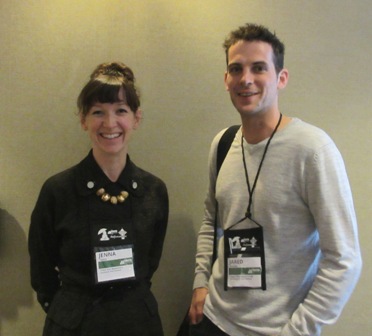Jared Raines and Jenna Todd: Shelf Awareness
Jared Raines and Jenna Todd, two indie booksellers from New Zealand, attended Winter Institute 9 in Seattle, Wash., thanks to a sponsorship from Kobo and a contest run by Booksellers New Zealand (the N.Z. equivalent of the ABA). As part of the arrangement, the two booksellers also spent the week after Winter Institute working at two Seattle-area indies. Todd, manager of Time Out Bookstore in Auckland, worked at Third Place Books in Lake Forest Park and Ravenna, Wash., while Raines, owner and manager of Paperplus Northlands in Christchurch, worked at Elliott Bay Book Company in Seattle. | |
| Jenna Todd and Jared Raines | |
"There is also less of a focus on sideline product in the U.S. than we have in N.Z.," Raines added. "Most bookstores in our group have a very strong personal and commercial stationery offering."
Raines's store, which was opened by his family 33 years ago, has been franchised by several different brands and has traded under a number of names, the first of which was Target Books & Stationery. Raines began working in the family business in 1996, when he was 14. In 2010, he took over full management of the business. He currently employs 12 staff members; during the holidays, which are in the middle of summer in New Zealand, that increases to 15 or 16.
Another key difference between bookselling in N.Z. and the U.S., Raines said, was the lack of wholesalers in the former. N.Z. indies, he explained, really have only publishers as their main suppliers.
"This does at times cause issues, as publishers make printing decisions based on sell-in numbers," Raines explained. Indies typically cannot afford to buy three or four months worth of stock at release, which often leads to the underprinting of N.Z. titles. And, aside from Random House and some local publishers, the majority of large publishers have consolidated their New Zealand operations with their offices in Australia. This has led to complications with shipments; a delivery within 3-5 days is considered fast. If the wholesale model were adopted in N.Z., Raines asserts, that could go a long way in solving these problems.
Todd was struck in a similar way by the size of Third Place Books. Her own store occupies approximately 700 square feet of a long, narrow heritage building, with an upper floor devoted to events and community gatherings. Time Out carries around 17,000 volumes across many genres; the store's only focus, Todd said, was on "the best of the best." She reported that literary fiction, children's books and coffee table books do particularly well.
The frequency of author events at American indies and the relatively low price of books compared to N.Z. also struck Todd. Author visits are rare for most N.Z. indies, although Time Out is fortunate to have author Eleanor Catton as a regular customer (the launch party for The Luminaries, Catton's Booker Prize-winning novel, was held at the store). She attributed both differences to New Zealand "being at the bottom of the world."
"However," Todd added, "one thing I learned when I was visiting all of these excellent stores in Seattle is that we just slot right alongside their high caliber--Time Out is just as excellent and special!"
Todd has worked at Time Out for four years, and has been manager for two. There are 12 staff members, most of whom work part time and are involved in a range of creative endeavors (Todd, for example, is a photographer, and the store also employs a director, an actress, a writer and a musician).
Todd said overall of the Winter Institute that "there was just immeasurable value from just talking and spending time with all of the wonderful book people who attended WI9. It was such a fantastic experience."
Similarly, Raines said he appreciated the people at WI9. "I really was made to feel like part of the U.S. bookselling community," he said. "The most interesting thing I learned while there is that we all have the ability to survive the changing retail climate that is hitting our industry; we must work hard to be involved in our community, and be more than just a store full of product."
And as for what he brought to Elliott Bay, Raines reported that his American counterparts were frequently interested in his retail system and his store's security camera system. He also provided, he added, the "terrible Kiwi accent and colloquialisms!" --Alex Mutter
No comments:
Post a Comment